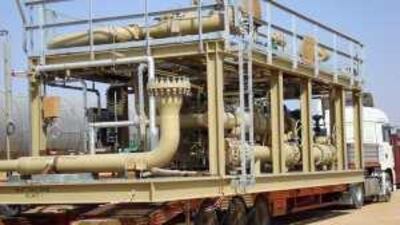ERBIL // Investment from the UAE in Iraqi Kurdistan is expected to double to US$6 billion (Dh22.03bn) within three years as the region's vast gasfields attract a wave of foreign capital. Abu Dhabi National Energy Company, or Taqa, is among the companies considering investments in the power sector.
Carl Sheldon, the general manager of Taqa, said: "As the economy grows and Iraq stabilises it is a natural country for Taqa to invest in. Particularly on the power and water side, the needs are tremendous." Taqa representatives are part of a delegation of government and business officials from the UAE visiting Iraqi Kurdistan to look into investment opportunities. The region is estimated to have 200 trillion cubic feet of natural gas, as well as oil reserves amounting to 45 billion barrels.
Investment in the region from the UAE is expected to reach about $3bn this year, but that could rise to $6bn within three years, according to Sinan Celebi, the minister of trade and industry in the Kurdistan regional government. Dana Gas, based in Sharjah, already has operations in Iraqi Kurdistan and is in a partnership that is developing a large gasfield that is supplying fuel for regional electricity generation.
The group has recently completed construction of a gas processing plant that is expected to contribute substantially to the profitability of the venture, in which Dana holds a 40 per cent interest. "We are increasing production and have completed train one of the facilities," Ahmed al Arbeed, the chief executive of Dana Gas, said in an interview yesterday. "We are producing 150 million standard cubic feet per day and about 6,500 barrels of condensate. We are in the process of increasing that to 200 million standard cubic feet per day by the end of this year.
"We will also produce LPG after a couple of months. We expect to reach a level of 500 metric tonnes per day. We have another train to complete, probably next year, which will increase production." Years of war and under-investment have left Iraq with a dilapidated power network, despite the country's huge untapped oil and gas reserves. The Baghdad government is expected to start handing out oil and gas licences in September as planned, said Ashti Hawrami, the minister of natural resources in Iraqi Kurdistan.
Iraq's government this week approved an agreement between the oil ministry and the majority-Kurdish region in the country's north to export crude produced there, opening the way for shipments to resume after months of delay. The country is also expected to supply the Nabucco gas pipeline, which is intended to reduce Europe's dependence on Russian fuel. Mr Hawrami said: "This is a temporary arrangement and a final agreement is needed. Iraq needs a resolution to agree revenue shares and hydrocarbon legislation, and we hope that the government will deal with this quickly."
Mr al Arbeed said the pipeline project would be good for the Gulf. "Nabucco is in the interests of the region and will add value to the region and companies involved," he said. Construction on the $9.7bn Nabucco project is expected to begin next year. Iraq, which holds the third-largest oil reserves in the world, hopes to develop gas production to feed new power plants. The country's oil ministry auctioned development rights for the Akkas and Mansouriya gasfields last year but did not receive any offers.
Akkas, Mansouriya and a third gasfield in Siba are expected to be part of a third bidding round. tarnold@thenational.ae

